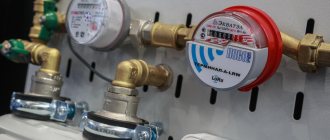Until recently, general household needs (GDN) were highlighted in the receipt for payment of housing and communal services, as a separate service for the maintenance of an apartment building. Taking into account many factors, including technical nuances, some changes were made to Government Decree No. 354 in 2017.
Since today not all multi-storey buildings have common household electricity meters, the government decree contains rules for calculating the consumed resource in several options, taking into account the specifics of a particular situation. It is difficult to predict when all residential buildings will be transferred to DUPU. This process includes not only the purchase of meters and installation work, but also the replacement of energy equipment with newer systems that will help to significantly reduce the level of resource loss.
Given the latest legislative changes, ODN are now included in the category of housing services. This innovation received legal force in January 2021. As consumers have probably already noticed, with this change the amount to be paid has also increased.
The calculation of ODN, referring to Government Decree No. 354, is provided separately for each service provided, including not only electricity, but also water supply, sewerage, gas, heating.
Dear readers!
Our articles talk about typical ways to resolve legal issues, but each case is unique. If you want to find out how to solve your specific problem, please contact the online consultant form on the right →
It's fast and free!
Or call us by phone (24/7):
What is included in the service
Considering general household electricity needs as a separate category, it should be noted that this is necessary in order to provide and maintain lighting in a multi-story residential building. This refers to the provision of electricity to residents without taking into account their personal apartments and non-residential premises belonging to a specific owner.
The list of energy costs for ODN includes:
- Providing lighting on landings, in entrances, vestibules, basements and on technical floors, if there are engineering communication systems there;
- Maintaining uninterrupted operation of the intercom;
- Electricity consumed to operate the elevator;
- Resource losses arising from technological factors;
- Operation of CCTV cameras if they are installed in the house.
Studying paragraphs ODN 354 of the Government Decree, it is easy to notice that the amount of payments for this type of service depends on the presence or absence of communal meters. Those who do not have such devices will have to overpay, since most of the loss of resource will be attributed to them. Based on this, it is wiser to start installing the equipment as early as possible, since no one will reimburse or revise the payment.
Is the owner of a non-residential premises obliged to pay electricity costs for general house needs?
Lawyer Bakumenko Igor Aleksandrovich
Call now and get a preliminary consultation:
8-919-865-42-20 8
On the merits of the question asked, we report the following.
According to Article 210 of the Civil Code of the Russian Federation (hereinafter referred to as the Civil Code of the Russian Federation), the owner bears the burden of maintaining the property he owns, unless otherwise provided by law or contract.
By virtue of paragraph 4 of Article 214 of the Civil Code of the Russian Federation, state-owned property is assigned to state enterprises and institutions for possession, use and disposal.
In accordance with paragraph 1 of Article 296 of the Civil Code of the Russian Federation, a state-owned enterprise and institution, to which property is assigned with the right of operational management, own, use and dispose of this property within the limits established by law, in accordance with the goals of its activities, the tasks of the owner of this property and the purpose of this property.
Based on the explanations contained in paragraph 2 of paragraph 5 of the Resolution of the Plenum of the Supreme Court of the Russian Federation and the Plenum of the Supreme Arbitration Court of the Russian Federation dated April 29, 2010. No. 10/22 “On some issues arising in judicial practice when resolving disputes related to the protection of property rights and other real rights”, by virtue of paragraph 5 of paragraph 1 of Article 216 of the Civil Code of the Russian Federation, the right of operational management refers to the real rights of persons who are not owners .
Thus, within the meaning of Articles 210, 296 of the Civil Code of the Russian Federation, the right of operational management has a proprietary nature and not only provides its subjects with the powers to own and use property, but also imposes on them responsibilities for maintaining the property.
In accordance with Art. Art. 210, 249 Civil Code of the Russian Federation, clause 1, art. 158 of the Housing Code of the Russian Federation (hereinafter referred to as the Housing Code of the Russian Federation), the owner of premises in an apartment building, along with the provision of paragraph 1 of Article 39 of the Housing Code of the Russian Federation, is charged with the responsibility for maintaining common property in an apartment building in proportion to his share in the right of common ownership of this property by payment for the maintenance and repair of residential premises.
Thus, the owner of a non-residential premises located in an apartment building, by virtue of the direct instructions of the law, is obliged to bear the costs of maintaining and repairing common property in an amount determined by the ratio of the areas of the residential building and non-residential premises.
This legal position is confirmed by judicial practice (see: Resolution of the Presidium of the Supreme Arbitration Court of the Russian Federation dated November 9, 2010 No. 4910/10 in case No. A71-9485/2009-GZ “... the owner of non-residential premises located in an apartment building, by virtue of the direct instructions of the law, is obliged bear the costs of maintaining common property, regardless of whether he has the costs of maintaining his own premises, which are individually owned, and the costs of utilities.Maintenance of his own premises, payment for utilities consumed in it, as well as the maintenance of a land plot provided for individual use and not included in the common property of an apartment building, do not relieve the owner of the premises from the burden of expenses for maintaining the common property of the apartment building...").
According to Art. 157 of the Housing Code of the Russian Federation, the amount of payment for utilities is calculated based on the volume of consumed utilities, determined by the readings of the meter, and in their absence, based on the standards for the consumption of utilities approved by government authorities of the constituent entities of the Russian Federation.
The procedure for determining the amount of payment for utility services using metering devices and in their absence is determined by the Decree of the Government of the Russian Federation dated 05/06/2011. No. 354 “On the provision of utility services to owners and users of premises in apartment buildings and residential buildings” (hereinafter referred to as Decree of the Government of the Russian Federation No. 354).
According to clause 2 of the Government of the Russian Federation No. 354, a consumer is a person who uses, on the right of ownership or other legal basis, premises in an apartment building, residential building, household, consuming utilities.
Non-residential premises are premises in an apartment building that are not residential premises and the common property of the owners of the premises in the apartment building.
In accordance with clause 18 of the Government of the Russian Federation No. 354, the owner of non-residential premises in an apartment building has the right, in order to provide communal resources to the non-residential premises belonging to him in an apartment building, to enter into contracts for cold water supply, hot water supply, sewerage, electricity supply, gas supply, heating (heat supply) directly with resource supply organizations.
If the owner of a non-residential premises in an apartment building acquires communal resources under the specified agreements, such owner is obliged to pay for utilities provided for general house needs, as well as provide information on the readings of individual or common (apartment) meters, data on the volume of communal resources consumed during the billing period under the specified contracts.
Within the meaning of paragraph 40 of the Government of the Russian Federation No. 354, the consumer of utilities in an apartment building (with the exception of communal heating services), regardless of the chosen method of managing the apartment building, as part of the payment for utilities, separately pays for utilities provided to the consumer in a residential or non-residential premises, payment for utilities consumed during the use of common property in an apartment building.
Consequently, the owner of a non-residential premises has the right to enter into an energy supply agreement either with a utility service provider represented by a management company, a homeowners’ association, etc. or directly with the resource supplying organization.
At the same time, within the meaning of paragraphs. 18, 40 of the Decree of the Government of the Russian Federation No. 354, and in both cases the owner of non-residential premises is obliged to pay a fee for one-way access.
Based on the foregoing, it follows that by virtue of the law, the obligation to reimburse general house expenses is assigned to the owner of the non-residential premises or to the holder of the property right, in this case, to the person who has the right of operational management of the non-residential premises.
Thus, a medical organization is obliged to reimburse costs for electricity for common house needs, since it is the subject of operational management rights and the burden of expenses for maintaining common property in an apartment building in which the disputed non-residential premises is located lies with the organization.
A similar legal position is set out in the Resolution of the Presidium of the Supreme Arbitration Court of the Russian Federation dated March 4, 2014. No. 17462/13, Resolution of the Federal Antimonopoly Service of the Volga Region dated October 28, 2014. in case No. A65-2719/2014, Resolution of the Eleventh Arbitration Court of Appeal dated February 10, 2015. in case No. A49-8575/2013, Decision of the Arbitration Court of the Penza Region dated March 20, 2015. in case No. A49-267/2015.
Additionally, we inform you that in accordance with current legislation, the presence of a separate entrance does not exempt you from paying the costs of one-way access. A significant circumstance of legal significance for incurring expenses for the maintenance of common property and for paying for utilities consumed in common areas is the fact that the non-residential premises are located in an apartment building.
If an individual metering device is connected after a collective (common house) metering device and the latter, in turn, takes into account the readings, including the individual metering device of the owner of a non-residential premises, a fee for ODN is charged in this case.
These circumstances are also confirmed by judicial practice (see: Resolution of the Federal Antimonopoly Service of the North-West District dated May 14, 2010 in case No. A56-56016 “... the presence of a separate entrance to the premises is not a basis for relieving the owner of non-residential premises from bearing the burden of expenses for maintaining the common property of the owners of residential premises in an apartment building..."; Resolution of the Nineteenth Arbitration Court of Appeal dated July 16, 2013 in case No. A48-4560/2012 "... the owner of a non-residential premises, regardless of whether he has a separate entrance, and also regardless of whether he uses the entrance, roof, elevator or other common property of an apartment building, is obliged to pay for utilities purchased for the general needs of the apartment building..."; Resolution of the Sixth Arbitration Court of Appeal dated 01.06.2012 No. 06AP-2128/2012 in case No. A37-1985/2011 "... the obligation to bear the burden of expenses for maintaining common property does not depend on whether the owner uses individual objects of common property. ...Independent maintenance by the defendant of electrical equipment and networks under his jurisdiction does not relieve the owner from the responsibilities for the maintenance of common property assigned to him by law...").
Attention! The information provided in the article is current at the time of publication.
Calculation formulas
If there is a common electricity meter in a multi-storey building, the amount of common household needs is determined at a meeting of residents by Energonadzor employees. The difference between the ODPU indicator and the totality of readings from individual meters in residents’ apartments is taken as the basis. In this case, apartments in which meters are not installed must be taken into account, which, however, is rare today.
The resulting value is distributed among all apartment owners, without exception, taking into account the area they occupy. This means that the payment will not be the same. The larger the housing area, the higher the owner’s payment.
According to the meter (ODPU), the following formula is used to determine the amount of payment for electricity:
(Readings of a general building meter – Sum of readings of individual electricity meters for private non-residential premises – Sum of readings of individual metering devices for apartments – Electricity consumed in apartments where meters are not installed) * Area of the apartment for which the payment amount is calculated * Area of all available in a multi-storey building apartments = electricity according to ODN.
Application of tariffs
In the case where there is no common house metering device (HMU) in a multi-storey building, when determining payment, standards approved by the local administration are used. In each region they are determined separately, so they differ in different localities. You can see which standards apply to which houses by going to the official website of the local administration or service provider company in your region.
The standard is considered to be a limited amount, however, when consumers do not fit into this value for one reason or another, they have the right to independently decide at a meeting what amount of payment they should make. However, in practice, not a single such case has been recorded yet.
To calculate ODN for electricity, the formula is used:
Electricity consumption standards multiplied by the area of premises in the common property * Area of a separate apartment for which the payment amount is calculated / Area of residential apartments in a multi-storey building.
Electricity tariffs differ not only depending on regions. The amount of payments is also affected by the number of floors of an apartment building, the presence of an elevator, pumping equipment and power plants.
What are the innovations related to?
The government decision regarding the innovations specified in Resolution No. 354 means that management companies and homeowners’ associations cannot distribute electricity costs among homeowners that exceed established standards. If energy resources are used inappropriately, this will become a significant financial burden for consumers and management companies.
Thus, the management company and the homeowners association can only go in two ways. In the first case, it will be fraud, which consists of covering the costs of paying for utilities at the expense of other financial items. In the second case, this is the inclusion of hidden fees in payers' receipts. This is risky because such things will sooner or later become apparent.
As judicial practice shows, there have already been cases when the management company, for more than one year, blocked payments coming in for common household resources at the expense of fees for major repairs. As a result, when the management company becomes bankrupt, it is discovered that a huge amount has been spent. It is no longer the auditors who have to deal with such problems, but the prosecutor’s office and the investigative committee.
Every consumer who receives a receipt for utility bills wants to understand what he is paying for and why this particular amount was generated. For this, individual metering devices are needed, as well as general household metering devices, which is why the government continues to insist on installing them.
There is a situation when residents of an apartment building generally consume utilities above the norm. Invoices for excess standards for ODN are issued to them by the management company servicing the house or resource center. But how should it really be, and who should pay for excess consumption? Let's sort it out with a lawyer.
The situation when the bills in payments for one-time income are off the charts and shocking is not uncommon for Artyomovsk residents. "EV" periodically talk about this from their pages. Each time, residents have no choice but to pay and cry. Or, wasting your nerves and time, dealing with the complex intricacies of accruals. But this can be difficult to do - there are too many subtleties and we don’t know our rights: where and to whom we need to pay if a direct contract has been concluded with the resource provider, and the house is served by a management company or apartment building on self-government. What to do if you have an HOA.
Direct contracts with resource providers have long been firmly established in our lives, and are quite acceptable by law, even if residents have chosen a management organization. In theory, it should provide owners with a full range of utility services, including purchasing electricity from the supplier.
Here you need to take into account one thing - in the case of direct contracts, residents do not have to pay the resource officer for utilities consumed for the maintenance of common property in the apartment building. ODN are required to be paid, but only if the costs do not exceed established standards. If the costs for ODN are higher than the established standards, the responsibility for payment falls on the management company.
— Imposing payments for consumed electricity for general household needs in excess of the standard directly to consumers is unreasonable. — explains lawyer Ksenia Lumpova, — Residents’ payments, by virtue of Decree of the Government of the Russian Federation dated June 29, 2016 N 603 “On amendments to certain acts of the Government of the Russian Federation on the provision of utility services,” are limited by the value of the corresponding consumption standard. The management company, as an organization that manages the common property of an apartment building, is obliged to pay for consumed electricity in excess of the established standard. From 07/01/2016, regardless of the existence of an agreement concluded between the resource supply organization and the management company on the purchase of a communal resource of electricity for the needs of the public service center, the volume of excess consumption of electrical energy for general house needs must be paid by the management organization. An exception is the situation if, at a general meeting, residents decided to distribute the excess volume among consumers, thereby removing the obligation to pay from the management company.
Task efficiency
Management organizations are held liable for incorrect calculations of monthly payments, which is regulated by Federal Law No. 176, adopted on June 29, 2015. In accordance with Russian legislation, the management company is obliged to pay a penalty to consumers for poorly provided utility services or overpayment. The most stringent measure of administrative liability for management companies is applied precisely when settlements are violated, which leads to an increase in payments for consumers.
The management organization is obliged to pay all accrued fines to consumers. The management company can avoid administrative punishment if the violation that was discovered is eliminated before the application is made to the regulatory authorities. The effectiveness of the innovation according to the ODN standards also lies in the fact that it will not be possible to enter into direct contracts with organizations that supply resources. Moreover, each management organization undertakes to pay a penalty for late payment of received resources.
However, management organizations have the right to take other, more effective ways:
- Install common house electricity meters;
- Carry out energy-saving measures (insulation of an apartment building, replacement of wiring, etc.);
- Take meter readings at the same time;
- Control the unaccounted resource that was consumed.
Payment rules
354 of the decree of the Russian government regulates in separate paragraphs the payment for single-use electricity supply, requirements, as well as the procedure for establishing and applying social standards for electricity consumption, if a decision has been made in the region on the need to establish them. One calendar month is used as the billing period for paying housing and communal services. The amount of payments for utility services is calculated in accordance with the tariffs for individuals that are established by organizations in the region, referring to orders and other norms of Russian legislation on the formation and regulation of tariffs.
Speaking about communal apartments, if they are equipped with a common electricity meter, but not all rooms have individual meters, then the amounts of payments for electricity are calculated separately for each tenant. However, in this case, consumers must reach a certain agreement, since bills for the use of common property and lighting of common areas are paid by them jointly. This agreement must be drawn up in writing with the signatures of all consumers, that is, residents of a communal apartment, or their representatives by proxy. It is advisable to have this document certified by a notary. Cancellation of the agreement and changes to its clauses must also be documented.
Calculation of ONE. Explanations “at your fingertips”
There is an opinion in the world that the calculation of one should be made from the amount of electricity consumed by light bulbs in the entrances and above them; no more electricity is consumed anywhere. Unfortunately, this is a misconception, because... the amount of resource consumed depends, among other things:
- from technological losses (insignificant);
- from losses due to wear and tear of water and electricity engineering networks (it is noteworthy that the more twists the electrical wiring has, the greater the losses);
- theft of a communal resource in the range from a common house metering device to individual metering devices;
- unscrupulous attitude of the management company towards its obligations to implement energy saving measures and prevent the theft of electricity.
As you correctly noted, let’s look at the procedure for calculating one-time tax using the example of the utility resource “Electricity” provided to an apartment building.
I will not go into detail about the owner’s obligation to bear the costs of maintaining common property, which includes general house needs. This is a duty. So, let's take the initial data:
- there is an obligation to pay ODN;
- the apartment building is equipped with a common building metering device;
- the apartment building has a total living area of 1000 sq.m., where there are 10 apartments of equal areas of 100 sq.m.
Let's get started.
- We take readings from a common house meter (CDMU) provided to an apartment building for common house needs and individual consumption, for example, for February. The readings amounted to 7000 kW and from them we subtract the ODPU readings for January - 3000 kW. In total, we get the result of electricity consumption by an apartment building for February - 4000 kW.
- In the same way, we take readings from individual electricity meters (IMU) of each apartment and find that 2400 kW was spent on individual consumption in February.
- To get the ADN consumption for the entire apartment building for February, we subtract 2400 kW (individual consumption) from 4000 kW (total consumption). We get 1600 kW - this is one power source for the whole house.
- Now let’s distribute these 1600 kW to all apartments (in the example, they are equal in area) - we get 160 kW for each apartment.
And this is where the fun begins, friends. The distribution procedure specified in paragraph 4 is ideal for management organizations. This calculation will make the heads of management companies jump with happiness and clap their hands with joy. But the legislator, with the Rules for the Provision of Public Utilities, curbed the ardor of the negligent management of managers.
Literally from the Rules:
Distributed in accordance with formulas 11 - Appendix No. 2 to these Rules between consumers, the volume of utility services provided for common house needs during the billing period cannot exceed the volume of utility services calculated based on the consumption standards of the corresponding utility resource for the purpose of maintaining common property in an apartment building , except for cases where the general meeting of owners of premises in an apartment building, held in the established order, made a decision on the distribution of the volume of utilities in the amount of the excess of the volume of utilities provided for general house needs, determined based on the readings of the collective (communal) metering device, over volume, calculated based on standards for the consumption of communal resources for the purpose of maintaining common property in an apartment building, between all residential and non-residential premises in proportion to the size of the total area of each residential and non-residential premises.
Now let's decipher it. As they say in satirical Internet slang: there are many incomprehensible books.
In order not to confuse you even more, I will not make calculations using formulas. As we established above, a total of 1600 kW was provided to the house for general needs, and 160 kW for each apartment. Let us figuratively take 50 kW of electricity consumption standard for each apartment.
Thus, the management company is obliged to charge fees for electricity supply no higher than the standard. She is obliged to demand payment for one unit only for these 50 kW, and the remaining 110 kW for one apartment and 1100 kW for the whole house must be paid to the resource supplying organization out of her own pocket, with her own hard-earned money. Because:
When concluding contracts for the supply of utility resources for the purpose of providing utility services, approved by Decree of the Government of the Russian Federation of February 14, 2012 No. 124 and the above Rules, as well as in accordance with Decree of the Government of the Russian Federation of August 13, 2006 No. 491, this is the responsibility of the management company. The resource supplying organization has a boundary of division of responsibility - ODPU. As stated above, the excess ODN has been removed from the owners, and the management company is responsible for the maintenance of common property. Consequently, the excess ODN is assigned to her.
Using the example of the city of Belogorsk, management companies, for example, LLC “UK Concept” and LLC PZhT with their “subsidiaries” PZhT-1, 2, 3, in a number of cases come out of this situation unscathed. On their own initiative, they hold a general meeting and, under the guise of some “left-wing” issues, they ask people to tick the voting sheets. And the owners, without delving into the essence of the issues, vote for the following (quote from the general meeting):
Make a decision on the distribution of the volume of utility services in the amount of the excess of the volume of utility services provided for common house needs, determined based on the readings of the collective (community) metering device, over the volume calculated based on the standards for the consumption of communal resources for the purpose of maintaining common property in an apartment building, between all residential and non-residential premises in proportion to the size of the total area of each residential and non-residential premises
Having such a decision in hand, the management company will simply blame the owners for exceeding the ODN standards. In this case, the management organization is excluded from executing all technical issues in an apartment building: inspecting, repairing utility networks, equipment and devices of an apartment building, checking the actual number of citizens living in apartments not equipped with IPU, carrying out work to identify cases of theft of communal resources, monitoring correctness of payment.
Services of inadequate quality
When consumers receive utility services of inadequate quality, they have the right to independently, but it is better in the presence of neighbors, record the discrepancies, and then contact the management company with an application and request for a recalculation of payment. If no measures are taken by the management company or a negative answer is given, consumers have the right to contact the housing inspectorate, prosecutor's office or court with a complaint against the management company and demands for an inspection with a subsequent recalculation of payments already paid.
The inspection should be carried out by an independent commission, and apartment owners should remember that they can demand recalculation not for the actual period of provision of low-quality services, but for the period that is documented. That is, if the service is provided with really poor quality, not only in light, but also in water or heating, then it is necessary to immediately record all existing inconsistencies, even if there is no certainty that they will really be useful.
During the inspection, a corresponding act is drawn up, the number of copies of which must correspond to the number of interested parties, of which there must be at least two.
Dear readers!
It's fast and free!
Or call us by phone (24/7).
Housing and communal services / Tariffs for housing and communal services
Soon, residents of Russian cities will receive regular receipts for payment of housing and communal services. Those who live in apartment buildings should see changes in their payments for January. What to prepare for? The regional publication Penzenskaya Pravda asked the local housing inspectorate for clarification.
Changes in payment for general household consumption
We are used to paying for water and electricity used not only in apartments, but also for general house needs (GN). This fee was included in utilities and consisted of the difference between the readings of common house meters and the sum of the readings of individual meters, along with the standard volumes of those who do not have meters.
Those same ODNs were distributed in proportion to the area of the premises. True, not completely, but within the limits of the standards.
Now the payment for one service will be charged as part of the payment not for utilities, but for housing services, i.e. it will move from one line of the payment bill to another. Housing maintenance fees will include the cost of cold and hot water, electricity, as well as wastewater disposal for the purpose of maintaining common property in an apartment building.
There shouldn’t be an increase in payments, because they can’t charge more than the standard for housing services from the owner, but it hasn’t changed yet.
What about a fee reduction? This is possible subject to the responsibility and diligence of management companies, the boards of HOAs and housing cooperatives.
What is the essence of the changes in payment for general household needs?
The abbreviation “ONE” no longer appears in the Housing Code. A new one has appeared - “SOI” - maintenance of common property.
That is, in the column “Housing services” we will have to see four new lines - the types of resources consumed in the maintenance of common property: two lines are “DHW" (component “CW" and component “Thermal energy”), “CW” and “ Electricity".
And in the “Utilities” line only payments for individual consumption of resources will remain.
These changes came into force on January 1, 2021 in accordance with the Decree of the Government of the Russian Federation No. 1498 as part of the implementation of Federal Law No. 176, which amended the Housing Code back in mid-2015.
There are no standards for wastewater disposal yet, and there should not be such expenses for SOI in the bills. The same thing is with heating - the owner does not pay for heat outside the apartments.
Who is affected by the changes in payment for general needs?
All owners and users of premises in apartment buildings in which the management method is in effect - management companies, homeowners' associations and housing cooperatives.
Do I need to decipher the SOI fee?
This question, in particular, is asked by HOA managers, because people will be the first to come to them for clarification.
And it is absolutely reasonable, because the payment for housing services is not indicated on the receipts: there is one figure (for example, 18.11 rubles), and it includes everything. But if you add SOI to the tariff for housing services, the fee will increase, and this is illegal without the decision of the meeting of owners. What should I do?
The Housing Inspectorate explains to the boards of partnerships, cooperatives and management organizations that SOI must be allocated on separate lines.
By the way, the housing inspectorate has calculated that for a standard two-room apartment located in a nine-story building, the payment for cold water, hot water and electricity used for the maintenance of common property will be 1.65 rubles. per square meter.
Where to go with questions and complaints
1. To the organization that issued the invoice to you: the management company, the board of the HOA or the housing cooperative. Their addresses and telephone numbers are indicated on the payment slip.
2. To the regulatory authorities: housing inspectorate, as well as to the prosecutor’s office at the place of residence.
What if the house consumed a resource in excess of the standard?
This is a problem for management organizations, homeowners' associations, housing cooperatives: they will pay the “imbalance” to resource officers at their own expense. Moreover, as conceived by the legislators who rewrote the Housing Code, this state of affairs encourages management companies, HOAs and housing cooperatives to engage in energy conservation, more carefully monitor leaks in networks, seriously combat the theft of resources, identify those who “draw” zeros in apartment meter readings...
Housing and communal services news
Experts and the media are talking about the new Decree of the Government of the Russian Federation dated June 29, 2020 No. 950, mainly in light of the transfer of responsibility for installing and replacing electric power supply systems from premises owners to suppliers of this resource and network organizations. But it also applies to other RSOs. Find out in this article which ones and why.
RF PP No. 950 mainly concerns energy sales and network companies: according to the document, now they will install, maintain and repair electricity meters. But there is one change in it, which also applies to other RSOs that supply resources to apartment buildings with a direct or unselected/unimplemented management method.
In houses with a direct method of management and in apartment buildings where it is not chosen or implemented, there is no management organization or HOA, therefore, the owners of premises in the house are not provided with the housing service of the Kyrgyz Republic on SOI. Instead, consumers pay a utility fee to ODN. Before the advent of RF PP No. 950, the amount of payment for consumers for utility services provided for general household needs was calculated based on the volume not exceeding the consumption standard for the corresponding resource.
That is, the resource supplying organization, regardless of the actual quantity of supplied water supply, could only charge the residents of the house with the standard volume (paragraph two of clause 44 of RF PP No. 354). The excess standard was paid by the RSO itself. RF PP No. 950 changed this situation.
From July 1, 2021, para. 2 clause 44 of the RF PP No. 354 has lost force, and now the calculation of payments for all utilities, except for heat supply, in houses without a management company/homeowners association/housing complex is based on actual consumption, according to meter readings. RSO has the right to bill residents of apartment buildings the entire consumed volume.
The norm of RF PP No. 950 that RSOs can charge consumers in houses without a management company/HOA or cooperative the full amount of the utility resource consumed by them is correct. Only, as always, there is a “but”. As a rule, often under direct management there are old two-story wooden houses where people with little income live. If the executor of the CG takes and charges them the amount for the entire volume of one-time tax, most likely, this will lead to a social explosion and complaints to all levels of government, right up to the president.
The expert recommends that resource providers first systematically work through the issue in each specific home, and then charge for the RDU based on consumption. If the volume of ODN in the house is large, RSO should take a number of measures to reduce it.
If the resource supplier does not want problems with authorities and supervisory authorities and negativity in the media and social networks in its address, it should issue ODN to consumers based on fact, and not a standard, only after work has been done to reduce ODN in the house. As E. Shereshovets noted, changes in legislation are a good incentive to carry out measures to reduce the volume of emergency services in houses with direct management, because sometimes there is simply no time, no effort, no manpower for them.
Decree of the Government of the Russian Federation dated June 29, 2020 No. 950, in addition to adjusting the procedure for calculating fees for single-use electricity meters in houses without a management organization or HOA/cooperative, introduced changes to the procedure for installing and repairing individual electricity meters.
If previously the owners of the premises were responsible for this, then from July 1, 2020, such responsibilities passed to energy sales and network companies. To implement this innovation, changes were made to several legal acts at once:
— “Rules for non-discriminatory access to services for the transmission of electrical energy and the provision of these services” (RF PP No. 861).
— “Rules for the maintenance of common property in an apartment building” (RF PP No. 491).
— “Rules for the provision of utility services to owners and users of premises in apartment buildings and residential buildings” (RF PP No. 354).
— “Rules that are mandatory when a management organization or a homeowners’ association or a housing cooperative or other specialized consumer cooperative concludes contracts with resource supply organizations” (RF PP No. 124).
— “Minimum list of services and works necessary to ensure proper maintenance of common property in an apartment building” (RF PP No. 290).
All changes apply only to electricity meters and do not apply to metering devices for other utility resources. In the new resolution:
— it is spelled out how the interaction between electricity suppliers and service consumers will be structured;
— the responsibilities of the parties and the features of electricity metering are recorded;
— deadlines have been established for the completion of individual work on the operation of metering devices.
Source: RosKvartal® - Internet service No. 1 for management organizations https://roskvartal.ru/kommunalnye-uslugi/11789/kak-s-1-iyulya-izmenilsya-raschyet-platy-za-odn-v-domah-bez -uo-i-tszh







